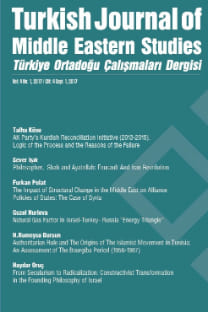Understanding of Iraq: the Whole Sweep of Iraqi History, from Genghis Khan's Mongols to the Ottoman Turks to the British Mandate to the American Occupation
Iraq is at the forefront of Middle Eastern countries to be examined for understanding of regional politics. The civilizational heritage and strategic location of oil reserves are the key elements that demonstrate the significance of the country. With its past, Iraq is a country with a long history of violence. The Iraqis lived under the authority of different powers. And the struggle for sovereignty continued from the Obeys to the Americans in this geography. The influence of the civilizations that had previously lived in the lands where the Iraqis lived on today still continues. Different ethnic, religious and cultural structures are evidence of this effect. The use of the titles “Asset King” of the Assyrians, “King of the World” of the Babylonians, “Single Leader” of Abdulkerim Kasım and “Brave Chief” of Saddam Hussein show how active geography is in politics. Practices based on oppression and coercion was implemented in Iraq, led by more authoritarian governments, far from the representative government. Saddam’s politics for the Kurt and politics for excluding Turkmen from politics are examples of this. On the other hand, Iraq, which was exposed to the British occupation after the Ottoman Empire, was later exposed to the US’ occupation and the influence of groups emerging in response to these occupations in the internal politics of the country still continues. Reactions to occupations do not lead to the unification of different groups within the country, which is a negative reflection of occupations on Iraqi politics. The radicalization of some groups against the occupation has also adversely affected the increasing stability in the terrorist region. The democracy that America wants to place in the post-occupation Iraqi domestic politics with Jay Graner does not fully cover Iraq. This prevented the establishment of a “national army” in Iraq where the US could cooperate. The US, therefore, failed to establish a working state mechanism in Iraq. The 2004 Constitution under US control carries similarities with the 1922 document on British control. The Sunni / Shiites dissociation in the country has increased because the content of the constitution is empty. The Bush administration proved that the region did not really understand the region when accusing the most secular regime of Iraq of terrorism.
Anahtar Kelimeler:
Iraq
Understanding of Iraq: the Whole Sweep of Iraqi History, from Genghis Khan's Mongols to the Ottoman Turks to the British Mandate to the American Occupation
Iraq is at the forefront of Middle Eastern countries to be examined for understanding of regional politics. The civilizational heritage and strategic location of oil reserves are the key elements that demonstrate the significance of the country. With its past, Iraq is a country with a long history of violence. The Iraqis lived under the authority of different powers. And the struggle for sovereignty continued from the Obeys to the Americans in this geography. The influence of the civilizations that had previously lived in the lands where the Iraqis lived on today still continues. Different ethnic, religious and cultural structures are evidence of this effect. The use of the titles “Asset King” of the Assyrians, “King of the World” of the Babylonians, “Single Leader” of Abdulkerim Kasım and “Brave Chief” of Saddam Hussein show how active geography is in politics. Practices based on oppression and coercion was implemented in Iraq, led by more authoritarian governments, far from the representative government. Saddam’s politics for the Kurt and politics for excluding Turkmen from politics are examples of this. On the other hand, Iraq, which was exposed to the British occupation after the Ottoman Empire, was later exposed to the US’ occupation and the influence of groups emerging in response to these occupations in the internal politics of the country still continues. Reactions to occupations do not lead to the unification of different groups within the country, which is a negative reflection of occupations on Iraqi politics. The radicalization of some groups against the occupation has also adversely affected the increasing stability in the terrorist region. The democracy that America wants to place in the post-occupation Iraqi domestic politics with Jay Graner does not fully cover Iraq. This prevented the establishment of a “national army” in Iraq where the US could cooperate. The US, therefore, failed to establish a working state mechanism in Iraq. The 2004 Constitution under US control carries similarities with the 1922 document on British control. The Sunni / Shiites dissociation in the country has increased because the content of the constitution is empty. The Bush administration proved that the region did not really understand the region when accusing the most secular regime of Iraq of terrorism.
___
- Understanding of Iraq: the Whole Sweep of Iraqi History, from Genghis Khan's Mongols to the Ottoman Turks to the British Mandate to the American Occupation Author: William R. Polk ISBN: 978-0060764692
- ISSN: 2147-7523
- Başlangıç: 2014
- Yayıncı: Sakarya Üniversitesi Ortadoğu Enstitüsü adına Ali Balcı
Sayıdaki Diğer Makaleler
Ortadoğu’daki Yapısal Değişimin Devletlerin İttifak Politikalarına Etkisi: Suriye Örneği
İsrail-Türkiye-Rusya "Enerji Üçgeni" ve Doğal Gaz Faktörü
Sekülerlikten Radikalleşmeye: İsrail’in Kurucu Felsefesinde Konstrüktivist Dönüşüm
Çözüm Sürecinin Yükseliş ve Düşüşü
Filozof, Şah ve Ayetullah: Foucault ve İran Devrimi
Dreaming of Freedom: Palestinian Child Prisoners Speak
